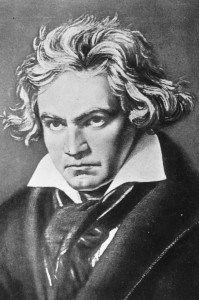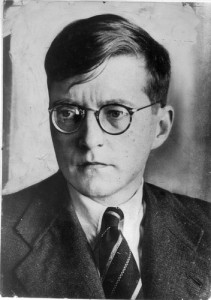The purpose of this series is to present the death metal fan (and by extension, the death metal writer/artist/composer) with a look into great classical string quartets that evoke the same violent and stark atmosphere that is typical of death metal.
The metal fan is encouraged to look beyond superficial parallels or differences so that he realizes how these string quartets by master composers developed into a cornucopia of expressions, patterns and details. I wish this would also be an aspiration or at least an inspiration for the artist (or would-be artist) that has the chance of reading it.
Another good reason to listen to string quartets in general is that they tend to express a more sincere and private facet of the composer while also being a test to his prowess in composition.
Ludwig van Beethoven: Op. 133, Grosse Fuge
Originally written as the last movement of his Op. 130, String Quartet No. 13 in B flat major, this massive movement was once commented on by Stravinsky saying that it is “an absolutely contemporary piece of music that will be contemporary forever.”. Stravinsky was referring to the absolute character of the music and its jarring disparity with temporal conventions.
https://www.youtube.com/watch?v=XEZXjW_s0Qs
Dmitry Shostakovich: String Quartet No. 10 in A flat, Op. 118
The well-known dark personality of Shostakovich’s compositions comes through in distilled and intensified manner in his string quartets. In here we find a mature Shostakovich channeling visions of a personal hell. We can imagine his will to fight through and see the light at the end of the tunnel despite facing terror and dread.
https://www.youtube.com/watch?v=Ven7hHpd_KU
Tags: Beethoven, Classical, Classical String Quartets for the death metal fan, composition, death metal, shostakovich




Give this a listen.
https://www.youtube.com/watch?v=7Pg3Hd55_w4&list=PL1FDB76E215B6FA2E
Awesome, cheers!
Schubert’s Death and the Maiden is another obvious pick for the metal-classical crossroad. Demented and morbid.
also… I know a lot of modernists and atonal guys are gonna get recommended, but linking them to metal just because they’re dissonant/harsh is kinda superficial.
Metal was never “deconstructionist,” and the most difficult modern classical was a traumatic response of the war–an attempt to deconstruct and question everything that came before. That’s just backpedaling, faggotry, hipsterism, liberalism, weakness… whatever, different words for the same thing.
For truly metal classical, stick with the Austro-German guys from the Baroque to mid-Romantic era. The cheekiest Mozart piece has that old hessian spirit, once you attune your ears to his musical language.
This is an ignorant take on modernist music. Schoenberg developed atonal music because it was, as he saw it the logical extension of the breakdown of tonal harmony in late romanticism. It was only the next wave of modernists who consciously avoided associations with common-practice period music and in this case they took discoveries that were made in the initial development of atonality (by Webern in particular) as their starting point. The results of the second wave of modernism were mixed but it certainly wasn’t inherently artistically bankrupts as you are suggesting.
Fully agree, I tried to say the same thing but was too frustrated to compose a coherent response.
Anton Webern – Slow Movement is the most beautiful piece ever written for string quartet. I wrote a piece on it and have been considering sending in to DMU when I see articles like this, but, haven’t. It’s a good lesson in structuring music using the sonata form as a narrative context but I’m guessing it will go over most reader’s heads.
How do you all organise your classical music?
I have iTunes and find it very daunting to sort it out.
I just have CD’s… I buy them and sometimes I’ll rip them to my PC and then transfer them to a flashdrive to listen to in the car. They are in alphabetical order by the composer’s last name.
Love the Beethoven quartet. Thanks for posting.
I particularly appreciate the write-ups on this site that deal with the intersection of metal and classical. And this is an interesting one because I’ve rather neglected string quartets and chamber music in general, preferring instead to focus on symphonies and choral works.
Oddly enough, I find I listen to more of the classical I discover here than the newer metal. I think the only two newer metal albums I’ve spent a lot of time with this year is the new Sammath and Summoning. Discovering Bruckner was sorta a revelation (and that was thanks to the first classical article I saw on here); his whole cycle of symphonies are just so goddamn beautiful, especially 4-8.
Sharing is caring:
Always liked Schubert’s string quartets. https://www.youtube.com/watch?v=2fQzOx7PBJ8
And something extra. Cherubini’s Requiem in C minor (he made a D minor one too, but I think this one’s better.) https://www.youtube.com/watch?v=laO7Zi6Zsm8
Nice series in perspective! Beethoven’s Grosse Fugue was undoubtedly the best piece to introduce it.
It seems to me that Karl Weigl’s work can be a great reference when it comes to “violent and stark atmosphere”: https://www.youtube.com/watch?v=ki9-GHE-reI
What about Bartok?
http://youtu.be/E_XNfKk-Qbs
Yngwie?
Troll?
Counterpoint kicks ass.
I like western classical music, I really do, but I have always found it odd when it was supported here in the way that it was. Western classical is a totally dead genre, in much worse straits than metal by far. So like: Our genre is prone and unconscious, while we wait to see if it will awaken here are some pretty scraps from a mummy to amuse you.
Then again good music is good music (and this is brilliance). I would say though that as an art music tradition it would be best if one appreciates western classical on its own merits rather than with a metal music lens. If one looks for some particular phrasing, some bombast, some sensation of darkness alone then this music will always be the sideshow, a curiousity.
I tend to agree with you, but it depends on how you define western classical music, since Post-Cagean Western “classical” music is very much alive, most notably composers like those on Wandelweiser Records.
Would you care recommending some records from this label? An album called “Harmony Series 11 – 16” is the only one I could find, which is super boring.
This is fairly accessible, on another label though:
https://www.musiques-suisses.ch/en/Juerg-Frey/Komponisten-Protrait/id/614
The Pisaro album you mentioned is great, but it requires a Cageian mindset, so if you don’t have that, yes, it will seem boring.
“The past is alive.”
The fact it’s classical isn’t important, the ideas are what’s important. On one hand you can’t live in the past, on the other hand discarding great music as “outdated” is worse because it’s like living in some illusory concept of the future.
True enough about “darkness”: it’s totally meaningless and over-used.
Classical music is alive for as long as you care to experience it. Music is the most immemorial of art forms and there’s hundreds of years of it to discover – more than enough to keep you occupied for a lifetime.
True art is everlasting!
“I would say though that as an art music tradition it would be best if one appreciates western classical on its own merits rather than with a metal music lens. If one looks for some particular phrasing, some bombast, some sensation of darkness alone then this music will always be the sideshow, a curiosity.”
You are completely right. And I just realized I introduced these series in the wrong way. It is not my intention to make this about superficial traits. about bombast and only some sensation of darkness… but I do understand that these are the easiest to latch on to for beginners coming from a death metal background.
I wish my fellow metalheads can look into the full beauty of string quartets as a genre of its own. But also that they may draw inspiration, not in a way of imitation as that would betray the nature of both genres, but in the way of taking more abstract concepts of excellence, aspiration and careful and mindful composition.
“abstract concepts of excellence, aspiration and careful and mindful composition.”
Ya know, A Blaze in the Northern Sky is my favorite Darkthrone release. It is visceral, spontaneous, raw (in terms of presentation of ideas, not anesthetics) and literal. The album is not a well ordered, Master plan, rather, it is the sum of highly skilled musicians colliding with one another. The lack of finely wrought compositions gives the album its sense of reality.
I know the DMU angle has been to push for more romanticist classical in metal, but I find that the most real experiences come from the richness of simply letting “it” flow. Is life a logical sequence of experience? I do not think so. Well planned art simply lacks a reflection of reality, though it may be incredibly beautiful.
This is a good post, but nevertheless there is a universal quality to music, to certain phrases, certain moments and moods that just affect us. Instead of describing it in ideological terms (`Romanticism`), if we describe it in terms of flavour, I feel this explains the abstract appreciation of metal and classical and the reality of a connection between them much better. Both are (despite the gulf here), cultivated genres of western music. It is almost inevitable that they share certain broad qualities that can only be explained in terms of abstract appreciation. The taste/colour of music etc.
Beyond that the slight goal/ideology connection enhances it even more so its not as if that is an invalid approach. It doesnt get to the point though.
As for your last statement, all we perceive and create is in the end a reflection of reality. We dont draw art from some metauniverse!
‘Reflection’ sounds so 360 BC.
I’m glad you see it this way. Metal is designed with fully different intentions than string quartets were. Please keep featuring classical works but keep in mind that most of us are prepared to appreciate/enjoy them for what they are and don’t need to have a comparison drawn to metal.
Really David that was no criticism. I dont believe you approached it the wrong way at all. It is merely a warning to potential listeners. Just: Enjoy something on its own merits. That is it. I fully agree with and appreciate attempting to ease one`s way into it by sampling similar flavours. Many people wont need such advice at all and will be tempted to give western classical the chance it deserves.
Shostakovich/Schoenberg/blablabla was like Devourment more that deathmetal,I guess